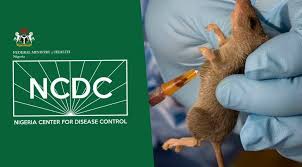The Nigeria Centre for Disease Control and Prevention (NCDC) has reported a significant increase in Lassa fever cases and fatalities in Nigeria between January and March 2024.
According to the NCDC’s Lassa Fever Situation Report for Epi Week 13, March 2531, 2024, a total of 150 deaths have been attributed to the disease, with a case fatality rate (CFR) of 18.6 percent.
This rate is higher than the CFR for the same period in 2023, which was 17.5 percent.
The report highlights that out of a total of 5,295 suspected cases reported, 806 were confirmed.
In week 13 alone, the number of new confirmed cases decreased from 25 in the previous week to 15.
These cases were reported in Ondo, Bauchi, Plateau, and Edo states. In total for 2024, 27 states have recorded at least one confirmed case across 125 local government areas (LGAs).
The NCDC has identified that 62 percent of all confirmed Lassa fever cases were reported from three states: Ondo (24 percent), Edo (22 percent), and Bauchi (16 percent).
The predominant age group affected is 31-40 years, with a male-to-female ratio for confirmed cases of 1:1.
Compared to the same period in 2023, there has been a notable increase in the number of suspected cases, rising from 4,338 to 5,295.
The NCDC has activated the National Lassa fever multi-partner, multi-sectoral Incident Management System at the Emergency Operations Centre (EOC) to coordinate the response to the outbreak at all levels.
Lassa fever is an acute viral hemorrhagic illness caused by the Lassa virus, which is transmitted to humans through contact with food or household items contaminated with rodent urine or feces.
The disease can spread from person to person through direct contact with infected bodily fluids. Symptoms include fever, headache, sore throat, muscle pain, chest pain, and vomiting.
In severe cases, it can lead to bleeding from the mouth, nose, or vagina, as well as low blood pressure and shock.
With the recent surge in Lassa fever cases and fatalities, the Nigerian government and the NCDC are working to contain the outbreak and prevent further spread.
Efforts include raising public awareness about the disease, improving surveillance and diagnostic capacity, and implementing infection prevention and control measures in healthcare facilities.
As the situation evolves, it is crucial for the global health community to monitor and support Nigeria’s efforts to address the Lassa fever outbreak.
The lessons learned from this outbreak can inform future strategies to prevent and control similar outbreaks in Nigeria and other countries facing similar challenges.
Subscribe to the Advocate News letter and receive news updates daily in your inbox.
 Advocate.ng Latest news update on politics, entertainment, sport and more
Advocate.ng Latest news update on politics, entertainment, sport and more




